Unit 11 How was your school trip Period 1 Section A (1a-2d)课件(共46张PPT)
文档属性
| 名称 | Unit 11 How was your school trip Period 1 Section A (1a-2d)课件(共46张PPT) | 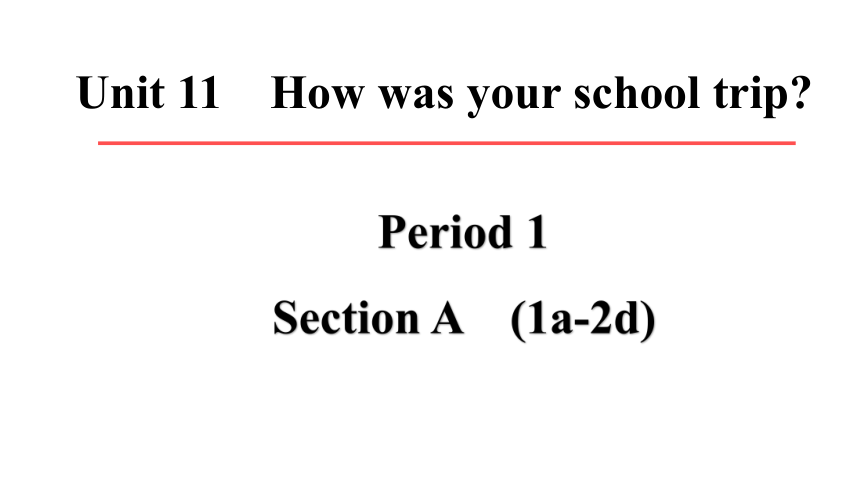 | |
| 格式 | pptx | ||
| 文件大小 | 21.8MB | ||
| 资源类型 | 教案 | ||
| 版本资源 | 人教新目标(Go for it)版 | ||
| 科目 | 英语 | ||
| 更新时间 | 2023-12-17 09:19:49 | ||
图片预览


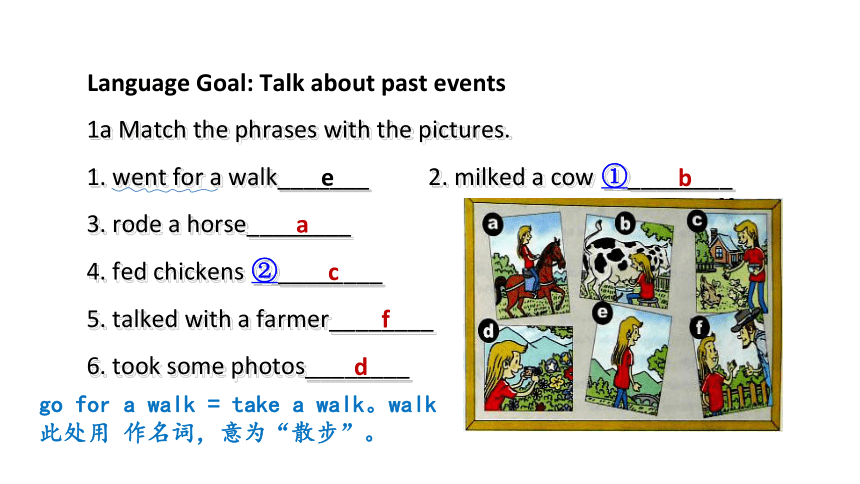
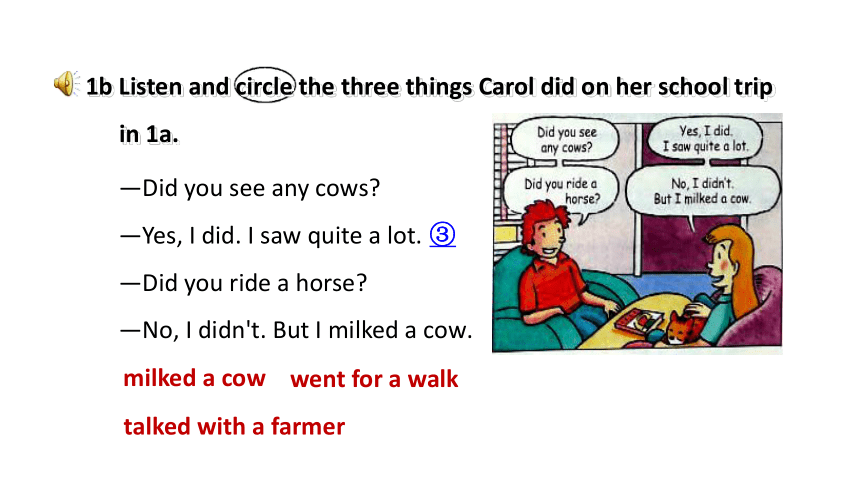
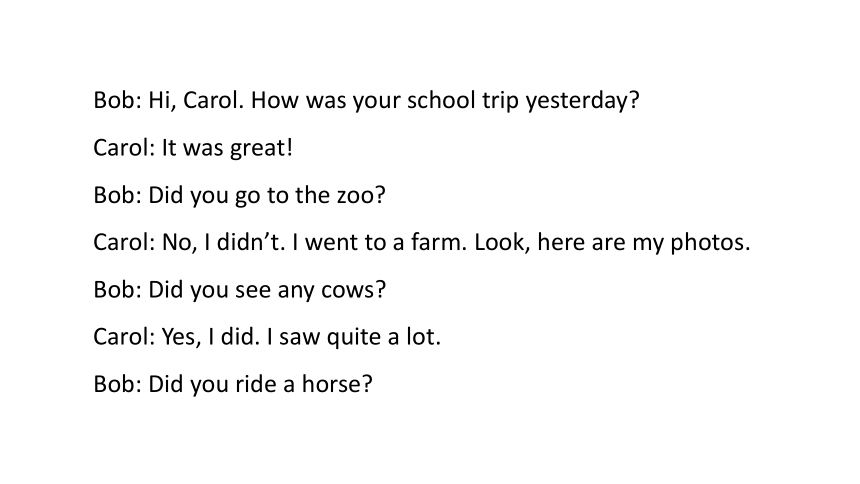
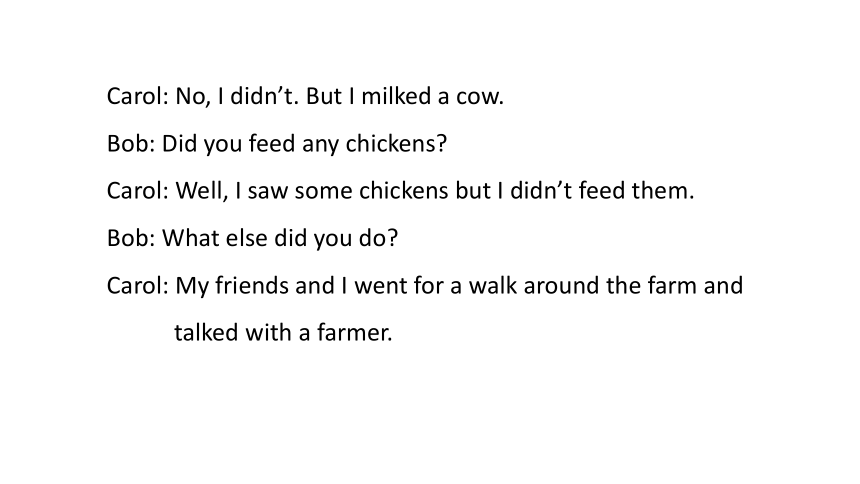
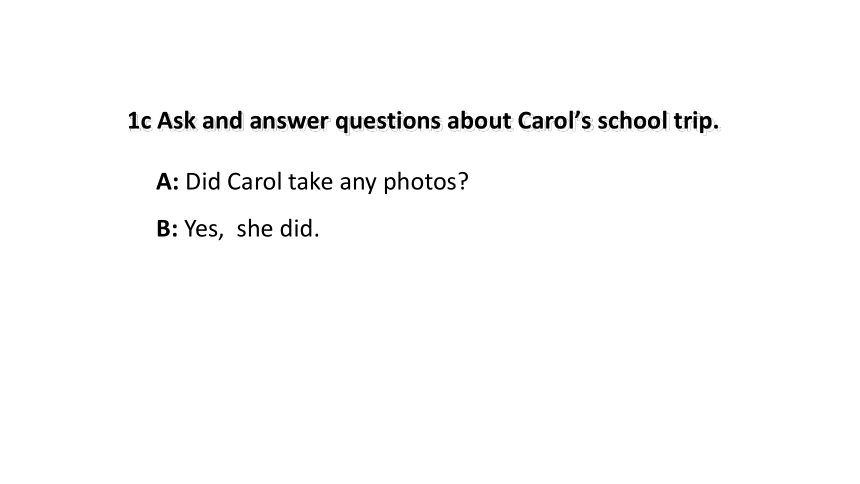
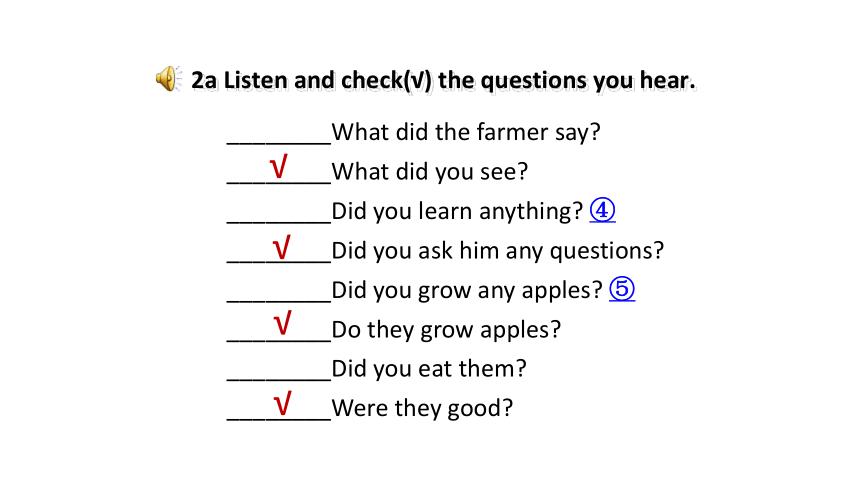
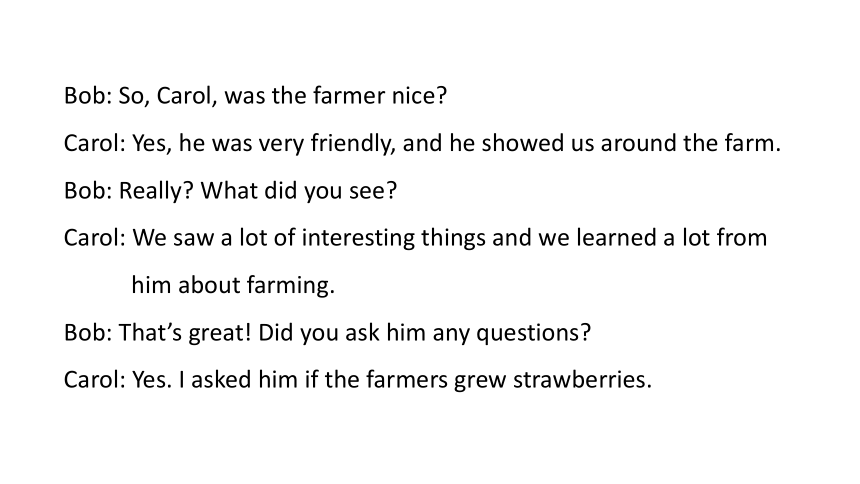
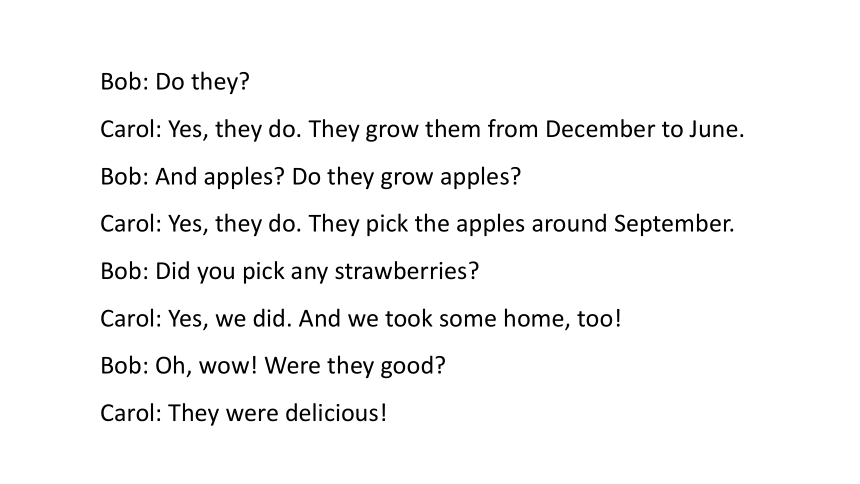
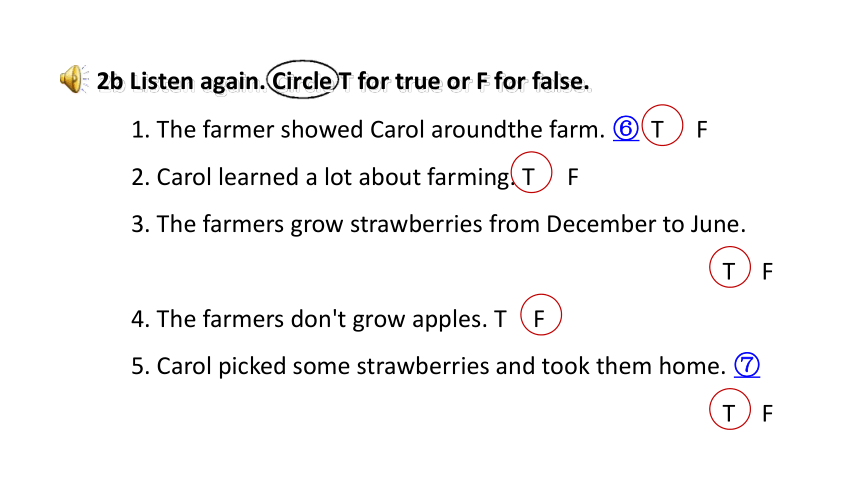
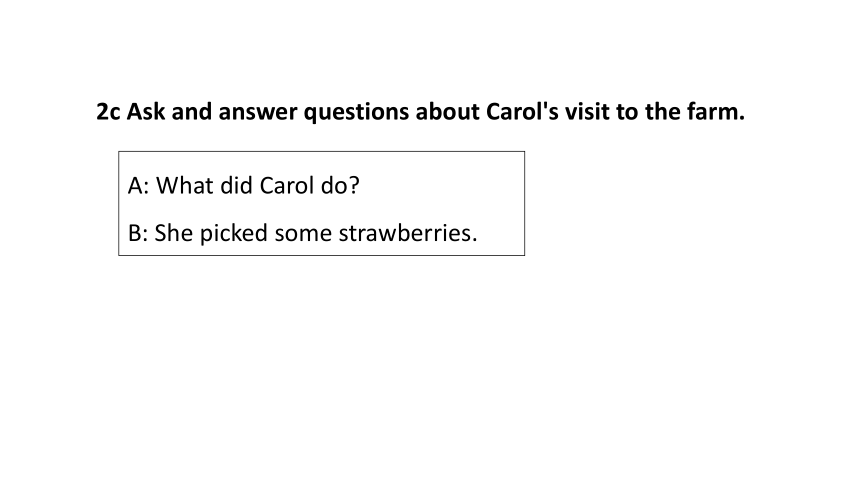
文档简介
(共46张PPT)
Period 1
Section A (1a-2d)
Unit 11 How was your school trip
Do you remember your last trip Where did you go
1a Match the phrases with the pictures.
1. went for a walk_______ 2. milked a cow ①________
3. rode a horse________
4. fed chickens ②________
5. talked with a farmer________
6. took some photos________
Language Goal: Talk about past events
b
e
a
c
f
d
go for a walk = take a walk。walk 此处用 作名词,意为“散步”。
1b Listen and circle the three things Carol did on her school trip in 1a.
—Did you see any cows
—Yes, I did. I saw quite a lot. ③
—Did you ride a horse
—No, I didn't. But I milked a cow.
milked a cow
went for a walk
talked with a farmer
Bob: Hi, Carol. How was your school trip yesterday
Carol: It was great!
Bob: Did you go to the zoo
Carol: No, I didn’t. I went to a farm. Look, here are my photos.
Bob: Did you see any cows
Carol: Yes, I did. I saw quite a lot.
Bob: Did you ride a horse
Carol: No, I didn’t. But I milked a cow.
Bob: Did you feed any chickens
Carol: Well, I saw some chickens but I didn’t feed them.
Bob: What else did you do
Carol: My friends and I went for a walk around the farm and talked with a farmer.
1c Ask and answer questions about Carol’s school trip.
A: Did Carol take any photos
B: Yes, she did.
2a Listen and check(√) the questions you hear.
________What did the farmer say
________What did you see
________Did you learn anything ④
________Did you ask him any questions
________Did you grow any apples ⑤
________Do they grow apples
________Did you eat them
________Were they good
√
√
√
√
Bob: So, Carol, was the farmer nice
Carol: Yes, he was very friendly, and he showed us around the farm.
Bob: Really What did you see
Carol: We saw a lot of interesting things and we learned a lot from him about farming.
Bob: That’s great! Did you ask him any questions
Carol: Yes. I asked him if the farmers grew strawberries.
Bob: Do they
Carol: Yes, they do. They grow them from December to June.
Bob: And apples Do they grow apples
Carol: Yes, they do. They pick the apples around September.
Bob: Did you pick any strawberries
Carol: Yes, we did. And we took some home, too!
Bob: Oh, wow! Were they good
Carol: They were delicious!
2b Listen again. Circle T for true or F for false.
1. The farmer showed Carol aroundthe farm. ⑥ T F
2. Carol learned a lot about farming. T F
3. The farmers grow strawberries from December to June.
T F
4. The farmers don't grow apples. T F
5. Carol picked some strawberries and took them home. ⑦
T F
2c Ask and answer questions about Carol's visit to the farm.
A: What did Carol do
B: She picked some strawberries.
2d Role play the conversation.
Peter: Hi, Eric. How was your trip last week ⑧
Eric: It was excellent. ⑨ I visited my grandparents in the countryside. ⑩
Peter: Oh, nice. What did you do
Eric: I went fishing every day. And I fed the chickens with my grandpa. It was so much fun.
丰富业余生活,培养热爱生活的
Peter: Sounds good. How was the weather there
Eric: It was great, and the air was so clean. I watched the stars at night. They were so beautiful.
Peter: Lucky you.
①milked a cow
milk /m lk / v. 挤奶
milk 作及物动词,意为“挤……的奶”。
e.g. Now they are milking a cow.
现在他们正在给奶牛挤奶。
考点1
milk a cow 给奶牛挤奶
考向
拓展:(1)milk 还可用作不可数名词,意为“牛奶;奶”。
e.g. Do you take milk in your tea
你茶里加奶吗?
(2)和“牛”有关的英语单词:milk(牛奶)、beef(牛肉)、cow(母牛;奶牛)、ox(公牛)、veal(小牛肉)。
考题1: [贺州] —How much ________ do you need
—We need two cups.
A. milk B. egg
C. pear D. potato
A
返回
②fed chickens
feed /fi d/ v. 喂养;饲养(feed—fed—fed)
feed 用作及物动词, 其后常接表示动物的名词作宾语。
考点2
feed 的常用搭配:
① feed...to... 把……喂给……
② feed...on/with... 用……喂养……
③ feed on... (动物)以……为食
考向
e.g. My grandma feeds chickens every day. 我奶奶每天都喂鸡。
Please feed some fish to the cat. 请给猫喂些鱼。
Let’s feed the monkey on/with some bananas.
让我们给猴子喂些香蕉吧。
Pandas are black and white. They feed on bamboo.
大熊猫黑白相间。它们以竹子为食。
拓展:feed 作及物动词,还可意为“养;养活(全家,一群人)”。
e.g. The elder brother had many children to feed.
哥哥有许多孩子要养活。
考题2: He makes robot bees to help _______ and look after the queen bee.
A. wash B. feed
C. use D. milk
【点拨】句意:他制造了机器人蜜蜂来帮助喂养和照顾蜂王。由look after及选项可知,feed 符合语境。
返回
B
③I saw quite a lot.
quite a lot 许多
e.g. He drank quite a lot. 他喝了好多。
考点3
在句中修饰动词
辨析: quite 与very
非常 quite 程度副词,意为“相当;非常”,可修饰副词、形容词、动词。只能放在不定冠词a /an 之前。可以修饰a lot ,a few,a little 等短语。常用结构为“quite + a/an+ 形容词+ 名词”。
very 程度副词,意为“很,非常”,语气比quite 重。可修饰副词和形容词,不可直接修饰动词。一般放在不定冠词a/an 之后。可修饰few,little 等词。常用结构为“a+very+ 形容词+ 名词”。
e. g. It’s quite/very necessary to stop school bullying.
阻止校园欺凌非常有必要。
My brother thinks Li Lei sings quite/very well.
我哥哥认为李雷唱得非常好。
She quite likes swimming. 她非常喜欢游泳。
Tom is a very good boy. = Tom is quite a good boy.
汤姆是个很好的男孩。
小贴士:
① quite a lot of 意为“许多……”,后接可数名词复数或不可数名词。
e.g. quite a lot of food 很多食物
② quite a little 意为“相当多的”,修饰不可数名词。
e.g. quite a little time 相当多的时间
考题3: —Why do you want him to join us
—Because he is _______.
A. good a quite player B. quite a good player
C. a quite good player D. quite good a player
B
返回
④Did you learn anything
anything /'en θ / pron. 任何东西;任何事物
anything 常用于否定句或疑问句中, 用来代替something。
e.g. Can I get you anything to drink first
我能先给你拿些喝的东西吗?
We can’t believe anything he says.
我们无法相信他说的任何事。
考点4
考向1
anything 表示“随便哪个东西; 随便什么事物”时, 一般用于肯定句。
e. g. I want something to drink and anything is OK.
我想要喝点东西, 什么都行。
考向2
速记小法:口诀记复合不定代词的用法:
复合代词不一般,修饰成分在后边;
如若用来作主语,谓语动词用单三。
表示物的不定代词
something 某事,某物
anything 任何事物
nothing 没有什么
everything 所有事物,一切
表示人的不定代词
somebody 某人
anybody 任何人
nobody 没有人
everybody 所有人,人人
拓展:anything 具体用法还有:
用法 示例
形容词修饰anything 时,应置于其后。 Did you hear anything interesting
你有没有听到什么有趣的事
在表示请求、建议或征求意见的疑问句中不用anything,而要用something。 Would you like something to eat
你想要吃点东西吗
anything 作主语时, 谓语动词用单数。 Anything in the room is his.
这个房间里的任何东西都是他的。
考题4: [济南] —Did you do _______ special for your mother on her birthday
—Yes. I cooked long noodles for her.
A. nothing B. something
C. everything D. anything
【点拨】由答语可知,问句问是否为妈妈的生日做了什么特别的事,故空处填“某事”。本句是一般疑问句,用anything。
返回
D
⑤Did you grow any apples
grow/ɡr / v. 种植; 生长; 发育
考点5
谚语:
It takes ten years to grow a tree, but a hundred to bring up a person.
十年树木,百年树人。
用法 示例
及物动词, “种植; 栽培”, 过去式是grew。 We grow flowers in our garden.
我们在我们的花园里种花。
不及物动词,“成长;生长;发育”。grow up 意为“长大;成长”;grow into 意为“成长为……” In spring, everything begins to grow.
在春天, 万物开始生长。
She wants to be a teacher when she grows up.
她长大后想当一名老师。
The little boy will grow into a strong man.
这个小男孩将会长成一个强壮的男子汉。
可作连系动词, 有“逐渐变得”的含义, 强调变化过程。 It’s growing dark. 天渐渐(变)黑了。
He grew excited when he met his old friend.
当他见到老朋友时,他变得很激动。
grow 的具体用法:
考向
返回
考题5: [海南] —What are you going to be when you _______
—I want to be a doctor like Wu Mengchao.
A. grow up B. turn up C. get up
【点拨】用语境判定法。grow up 长大;turn up 调大; get up 起床。由答语“我想成为像吴孟超一样的医生”可知问句是问你长大之后想干什么。grow up 符合语境。
A
⑥The farmer showed Carol around the farm.
show. . . around 带……参观
e. g. Let me show you around the city.
让我带你参观这座城市。
I like this place. Please show me around.
我喜欢这个地方,请带我四处看看。
考点6
show sb. around 带某人四处看看
拓展:(1)与show 有关的常见短语还有:
show up 露面;出现 show off 炫耀
(2)show 的相关用法(见Unit 1 Period 2 考点3)
around 相关短语
① turn around 转身
② look around 环顾四周
③ travel around 到处旅行
④ go/walk around 闲逛;到处走动
返回
farm /fɑ (r)m/ n. 农场v. 务农;种田
e.g. There are many cows on the farm.
在农场里有很多奶牛。
My parents are farming in the village.
我父母在村里务农。
The farmers work on farming all year round.
农民们全年都在务农。
考点7
n.,on the farm 在农场里
v.
farm 的词形变化:farming 不可数名词 农事;务农
farmer 可数名词 农民;农场主
⑦Carol picked some strawberries and took them home.
pick /p k/ v. 采;摘
e.g. Pick a number from one to five.
从一至五中挑选一个数字。
Don’t pick flowers in the garden.
不要摘花园里的花。
考点8
pick 的一词多义:采;摘
挑选
拓展:pick up 意为“捡起;拿起;搭载;接某人”。
Mr. Smith picked up his hat and went out.
史密斯先生拿起帽子, 走了出去。
Pick me up at the hotel.
到旅馆来接我。
“动词+ 副词”短语,代词作宾语放中间。
考题6: [牡丹江、鸡西] Please _______ the rubbish (垃圾) and put it into the proper rubbish bin.
A. look up B. pick up C. grow up
B
返回
⑧How was your trip last week
How was... ……怎么样
考点9
本句是一般过去时的特殊疑问句,其结构为
“How + was + 主语+ 其他?”意为“……怎么样?”
小贴士:How is... 相当于 What’s... like 或What do you think of...
此句型是询问某事具体情况的常用语。常用“It was great!(太棒了!)/ It was OK.(还可以。)/ It wasn’t good.(不好。)/It was not bad.(还不错。)”等来回答。
e.g. — How was your holiday this year
你今年的假期怎么样?
— Really good. 相当好。
考向
考题7: —Hi, Jack! _________
—It was great. I want to watch it again.
A. Why did you come here
B. How was the movie last night
C. Did they go to the park yesterday
D. Could you show him the way
B
返回
⑨It was excellent.
excellent /'eks l nt/ adj. 极好的;优秀的
excellent 相当于very good,通常用于肯定句中。excellent 前有不定冠词时,应用an。
e.g. The food is excellent here. 这里的食物很好。
Keep practising, and you’ll be an excellent football player. 坚持练习,你就会成为一名出色的足球运动员。
He is excellent in math. 他数学非常好。
考点10
be excellent in/at...表示“在……方面极好”。
返回
考向
⑩ I visited my grandparents in the countryside.
countryside /'k ntrisa d/ n. 乡村;农村
常与the 连用。in the countryside 意为“在乡下; 在农村”。
e.g. Li Ming comes from the countryside. 李明来自农村。
拓展:country 作名词,意为“国家;乡下;乡村”。
e.g. The players are from different countries.
运动员来自不同的国家。
We want to take a vacation in the country.
我们想去乡下度假。
考点11
考向
返回
本节课主要练习了听力, 学习了谈论出游情况的句型及知识点quite a lot, anything, show…around, pick, excellent等的用法。
Period 1
Section A (1a-2d)
Unit 11 How was your school trip
Do you remember your last trip Where did you go
1a Match the phrases with the pictures.
1. went for a walk_______ 2. milked a cow ①________
3. rode a horse________
4. fed chickens ②________
5. talked with a farmer________
6. took some photos________
Language Goal: Talk about past events
b
e
a
c
f
d
go for a walk = take a walk。walk 此处用 作名词,意为“散步”。
1b Listen and circle the three things Carol did on her school trip in 1a.
—Did you see any cows
—Yes, I did. I saw quite a lot. ③
—Did you ride a horse
—No, I didn't. But I milked a cow.
milked a cow
went for a walk
talked with a farmer
Bob: Hi, Carol. How was your school trip yesterday
Carol: It was great!
Bob: Did you go to the zoo
Carol: No, I didn’t. I went to a farm. Look, here are my photos.
Bob: Did you see any cows
Carol: Yes, I did. I saw quite a lot.
Bob: Did you ride a horse
Carol: No, I didn’t. But I milked a cow.
Bob: Did you feed any chickens
Carol: Well, I saw some chickens but I didn’t feed them.
Bob: What else did you do
Carol: My friends and I went for a walk around the farm and talked with a farmer.
1c Ask and answer questions about Carol’s school trip.
A: Did Carol take any photos
B: Yes, she did.
2a Listen and check(√) the questions you hear.
________What did the farmer say
________What did you see
________Did you learn anything ④
________Did you ask him any questions
________Did you grow any apples ⑤
________Do they grow apples
________Did you eat them
________Were they good
√
√
√
√
Bob: So, Carol, was the farmer nice
Carol: Yes, he was very friendly, and he showed us around the farm.
Bob: Really What did you see
Carol: We saw a lot of interesting things and we learned a lot from him about farming.
Bob: That’s great! Did you ask him any questions
Carol: Yes. I asked him if the farmers grew strawberries.
Bob: Do they
Carol: Yes, they do. They grow them from December to June.
Bob: And apples Do they grow apples
Carol: Yes, they do. They pick the apples around September.
Bob: Did you pick any strawberries
Carol: Yes, we did. And we took some home, too!
Bob: Oh, wow! Were they good
Carol: They were delicious!
2b Listen again. Circle T for true or F for false.
1. The farmer showed Carol aroundthe farm. ⑥ T F
2. Carol learned a lot about farming. T F
3. The farmers grow strawberries from December to June.
T F
4. The farmers don't grow apples. T F
5. Carol picked some strawberries and took them home. ⑦
T F
2c Ask and answer questions about Carol's visit to the farm.
A: What did Carol do
B: She picked some strawberries.
2d Role play the conversation.
Peter: Hi, Eric. How was your trip last week ⑧
Eric: It was excellent. ⑨ I visited my grandparents in the countryside. ⑩
Peter: Oh, nice. What did you do
Eric: I went fishing every day. And I fed the chickens with my grandpa. It was so much fun.
丰富业余生活,培养热爱生活的
Peter: Sounds good. How was the weather there
Eric: It was great, and the air was so clean. I watched the stars at night. They were so beautiful.
Peter: Lucky you.
①milked a cow
milk /m lk / v. 挤奶
milk 作及物动词,意为“挤……的奶”。
e.g. Now they are milking a cow.
现在他们正在给奶牛挤奶。
考点1
milk a cow 给奶牛挤奶
考向
拓展:(1)milk 还可用作不可数名词,意为“牛奶;奶”。
e.g. Do you take milk in your tea
你茶里加奶吗?
(2)和“牛”有关的英语单词:milk(牛奶)、beef(牛肉)、cow(母牛;奶牛)、ox(公牛)、veal(小牛肉)。
考题1: [贺州] —How much ________ do you need
—We need two cups.
A. milk B. egg
C. pear D. potato
A
返回
②fed chickens
feed /fi d/ v. 喂养;饲养(feed—fed—fed)
feed 用作及物动词, 其后常接表示动物的名词作宾语。
考点2
feed 的常用搭配:
① feed...to... 把……喂给……
② feed...on/with... 用……喂养……
③ feed on... (动物)以……为食
考向
e.g. My grandma feeds chickens every day. 我奶奶每天都喂鸡。
Please feed some fish to the cat. 请给猫喂些鱼。
Let’s feed the monkey on/with some bananas.
让我们给猴子喂些香蕉吧。
Pandas are black and white. They feed on bamboo.
大熊猫黑白相间。它们以竹子为食。
拓展:feed 作及物动词,还可意为“养;养活(全家,一群人)”。
e.g. The elder brother had many children to feed.
哥哥有许多孩子要养活。
考题2: He makes robot bees to help _______ and look after the queen bee.
A. wash B. feed
C. use D. milk
【点拨】句意:他制造了机器人蜜蜂来帮助喂养和照顾蜂王。由look after及选项可知,feed 符合语境。
返回
B
③I saw quite a lot.
quite a lot 许多
e.g. He drank quite a lot. 他喝了好多。
考点3
在句中修饰动词
辨析: quite 与very
非常 quite 程度副词,意为“相当;非常”,可修饰副词、形容词、动词。只能放在不定冠词a /an 之前。可以修饰a lot ,a few,a little 等短语。常用结构为“quite + a/an+ 形容词+ 名词”。
very 程度副词,意为“很,非常”,语气比quite 重。可修饰副词和形容词,不可直接修饰动词。一般放在不定冠词a/an 之后。可修饰few,little 等词。常用结构为“a+very+ 形容词+ 名词”。
e. g. It’s quite/very necessary to stop school bullying.
阻止校园欺凌非常有必要。
My brother thinks Li Lei sings quite/very well.
我哥哥认为李雷唱得非常好。
She quite likes swimming. 她非常喜欢游泳。
Tom is a very good boy. = Tom is quite a good boy.
汤姆是个很好的男孩。
小贴士:
① quite a lot of 意为“许多……”,后接可数名词复数或不可数名词。
e.g. quite a lot of food 很多食物
② quite a little 意为“相当多的”,修饰不可数名词。
e.g. quite a little time 相当多的时间
考题3: —Why do you want him to join us
—Because he is _______.
A. good a quite player B. quite a good player
C. a quite good player D. quite good a player
B
返回
④Did you learn anything
anything /'en θ / pron. 任何东西;任何事物
anything 常用于否定句或疑问句中, 用来代替something。
e.g. Can I get you anything to drink first
我能先给你拿些喝的东西吗?
We can’t believe anything he says.
我们无法相信他说的任何事。
考点4
考向1
anything 表示“随便哪个东西; 随便什么事物”时, 一般用于肯定句。
e. g. I want something to drink and anything is OK.
我想要喝点东西, 什么都行。
考向2
速记小法:口诀记复合不定代词的用法:
复合代词不一般,修饰成分在后边;
如若用来作主语,谓语动词用单三。
表示物的不定代词
something 某事,某物
anything 任何事物
nothing 没有什么
everything 所有事物,一切
表示人的不定代词
somebody 某人
anybody 任何人
nobody 没有人
everybody 所有人,人人
拓展:anything 具体用法还有:
用法 示例
形容词修饰anything 时,应置于其后。 Did you hear anything interesting
你有没有听到什么有趣的事
在表示请求、建议或征求意见的疑问句中不用anything,而要用something。 Would you like something to eat
你想要吃点东西吗
anything 作主语时, 谓语动词用单数。 Anything in the room is his.
这个房间里的任何东西都是他的。
考题4: [济南] —Did you do _______ special for your mother on her birthday
—Yes. I cooked long noodles for her.
A. nothing B. something
C. everything D. anything
【点拨】由答语可知,问句问是否为妈妈的生日做了什么特别的事,故空处填“某事”。本句是一般疑问句,用anything。
返回
D
⑤Did you grow any apples
grow/ɡr / v. 种植; 生长; 发育
考点5
谚语:
It takes ten years to grow a tree, but a hundred to bring up a person.
十年树木,百年树人。
用法 示例
及物动词, “种植; 栽培”, 过去式是grew。 We grow flowers in our garden.
我们在我们的花园里种花。
不及物动词,“成长;生长;发育”。grow up 意为“长大;成长”;grow into 意为“成长为……” In spring, everything begins to grow.
在春天, 万物开始生长。
She wants to be a teacher when she grows up.
她长大后想当一名老师。
The little boy will grow into a strong man.
这个小男孩将会长成一个强壮的男子汉。
可作连系动词, 有“逐渐变得”的含义, 强调变化过程。 It’s growing dark. 天渐渐(变)黑了。
He grew excited when he met his old friend.
当他见到老朋友时,他变得很激动。
grow 的具体用法:
考向
返回
考题5: [海南] —What are you going to be when you _______
—I want to be a doctor like Wu Mengchao.
A. grow up B. turn up C. get up
【点拨】用语境判定法。grow up 长大;turn up 调大; get up 起床。由答语“我想成为像吴孟超一样的医生”可知问句是问你长大之后想干什么。grow up 符合语境。
A
⑥The farmer showed Carol around the farm.
show. . . around 带……参观
e. g. Let me show you around the city.
让我带你参观这座城市。
I like this place. Please show me around.
我喜欢这个地方,请带我四处看看。
考点6
show sb. around 带某人四处看看
拓展:(1)与show 有关的常见短语还有:
show up 露面;出现 show off 炫耀
(2)show 的相关用法(见Unit 1 Period 2 考点3)
around 相关短语
① turn around 转身
② look around 环顾四周
③ travel around 到处旅行
④ go/walk around 闲逛;到处走动
返回
farm /fɑ (r)m/ n. 农场v. 务农;种田
e.g. There are many cows on the farm.
在农场里有很多奶牛。
My parents are farming in the village.
我父母在村里务农。
The farmers work on farming all year round.
农民们全年都在务农。
考点7
n.,on the farm 在农场里
v.
farm 的词形变化:farming 不可数名词 农事;务农
farmer 可数名词 农民;农场主
⑦Carol picked some strawberries and took them home.
pick /p k/ v. 采;摘
e.g. Pick a number from one to five.
从一至五中挑选一个数字。
Don’t pick flowers in the garden.
不要摘花园里的花。
考点8
pick 的一词多义:采;摘
挑选
拓展:pick up 意为“捡起;拿起;搭载;接某人”。
Mr. Smith picked up his hat and went out.
史密斯先生拿起帽子, 走了出去。
Pick me up at the hotel.
到旅馆来接我。
“动词+ 副词”短语,代词作宾语放中间。
考题6: [牡丹江、鸡西] Please _______ the rubbish (垃圾) and put it into the proper rubbish bin.
A. look up B. pick up C. grow up
B
返回
⑧How was your trip last week
How was... ……怎么样
考点9
本句是一般过去时的特殊疑问句,其结构为
“How + was + 主语+ 其他?”意为“……怎么样?”
小贴士:How is... 相当于 What’s... like 或What do you think of...
此句型是询问某事具体情况的常用语。常用“It was great!(太棒了!)/ It was OK.(还可以。)/ It wasn’t good.(不好。)/It was not bad.(还不错。)”等来回答。
e.g. — How was your holiday this year
你今年的假期怎么样?
— Really good. 相当好。
考向
考题7: —Hi, Jack! _________
—It was great. I want to watch it again.
A. Why did you come here
B. How was the movie last night
C. Did they go to the park yesterday
D. Could you show him the way
B
返回
⑨It was excellent.
excellent /'eks l nt/ adj. 极好的;优秀的
excellent 相当于very good,通常用于肯定句中。excellent 前有不定冠词时,应用an。
e.g. The food is excellent here. 这里的食物很好。
Keep practising, and you’ll be an excellent football player. 坚持练习,你就会成为一名出色的足球运动员。
He is excellent in math. 他数学非常好。
考点10
be excellent in/at...表示“在……方面极好”。
返回
考向
⑩ I visited my grandparents in the countryside.
countryside /'k ntrisa d/ n. 乡村;农村
常与the 连用。in the countryside 意为“在乡下; 在农村”。
e.g. Li Ming comes from the countryside. 李明来自农村。
拓展:country 作名词,意为“国家;乡下;乡村”。
e.g. The players are from different countries.
运动员来自不同的国家。
We want to take a vacation in the country.
我们想去乡下度假。
考点11
考向
返回
本节课主要练习了听力, 学习了谈论出游情况的句型及知识点quite a lot, anything, show…around, pick, excellent等的用法。
同课章节目录
- Unit 1 Can you play the guitar?
- Section A
- Section B
- Unit 2 What time do you go to school?
- Section A
- Section B
- Unit 3 How do you get to school?
- Section A
- Section B
- Unit 4 Don't eat in class.
- Section A
- Section B
- Unit 5 Why do you like pandas?
- Section A
- Section B
- Unit 6 I'm watching TV.
- Section A
- Section B
- Review of Units 1-6
- Unit 7 It's raining!
- Section A
- Section B
- Unit 8 Is there a post office near here?
- Section A
- Section B
- Unit 9 What does he look like?
- Section A
- Section B
- Unit 10 I'd like some noodles.
- Section A
- Section B
- Unit 11 How was your school trip?
- Section A
- Section B
- Unit 12 What did you do last weekend?
- Section A
- Section B
